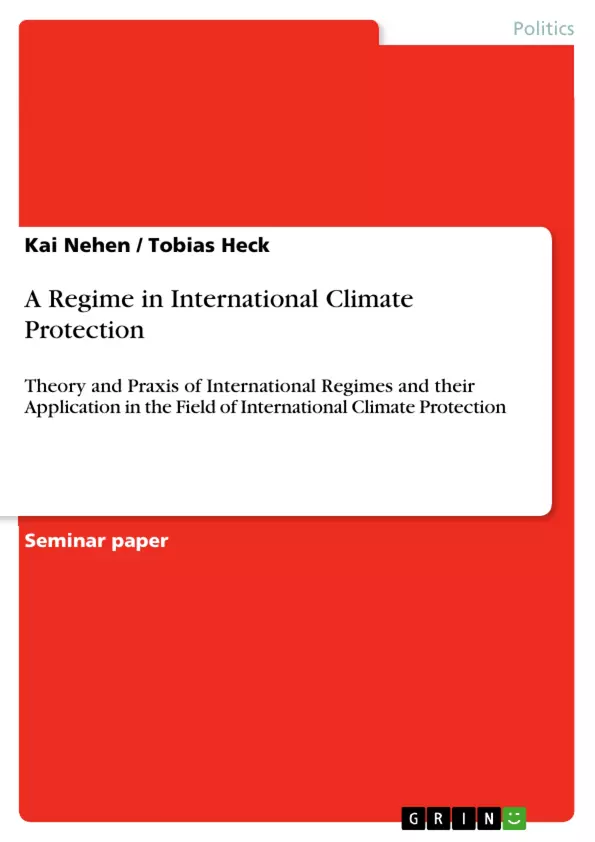Not just since the failure of COP-15 in Copenhagen in December 2009 we know that dealing
with climate change, its reasons and its consequences, is anything but easy.
Climate protection is a small part of a wider image: The fight of humankind against any form of environmental degradation. No matter if it concerns the hole in the ozone layer, forest decline caused by acid rain or the distinction of species, firm action is required.
Climate falls in the same category, but moreover it is much more difficult to handle: As a common good climate affects every state on earth, equal if it is being destroyed or protected.
Moreover, at first glance investments in climate protection seem to be curtailments in economic development and only having effects in the far future. Hence, we can consider climate politics on national and especially on international level as a hot subject where failures are easy and successes are rare, but where action is required.
We target to investigate if the United Framework Convention on Climate Change (FCCC) and the subsequent Kyoto Protocol (KP) compose an international regime on climate change and how well various international relations approaches are able to explain the actual outcome.
In the first part we start with the question: How do we know a regime when we see one?
Subsequently, we depict the road to the adoption of the FCCC and the KP, respectively.
Finally, we present different approaches in explaining the formation of regimes and use them to determine their predictive efficiency by applying them to our case study.
Inhaltsverzeichnis (Table of Contents)
- Introduction
- How Do We Know a Regime when We See One? – A Definition
- The FCCC and the KP
- The foundational period
- The agenda-setting phase
- Analysis
- Realism and Neorealism
- Neoliberal Institutionalism
- Constructivism
- Conclusion
- References
- List of Tables
- List of Illustrations
Zielsetzung und Themenschwerpunkte (Objectives and Key Themes)
This text aims to analyze the United Framework Convention on Climate Change (FCCC) and the Kyoto Protocol (KP) to determine if they constitute an international regime on climate change and to evaluate how well various international relations approaches can explain their outcomes. It specifically focuses on the explanatory power of realism, neorealism, neoliberal institutionalism, and constructivism in understanding the formation and efficacy of these agreements.
- The definition and characteristics of international regimes in the context of climate change.
- The historical development and evolution of the FCCC and the KP.
- The application of different theoretical frameworks (realism, neorealism, neoliberal institutionalism, constructivism) to explain the formation and outcomes of the FCCC and the KP.
- The strengths and limitations of these theoretical approaches in understanding international climate change politics.
- The challenges and opportunities associated with the establishment and implementation of effective international climate change regimes.
Zusammenfassung der Kapitel (Chapter Summaries)
- Introduction: The introductory chapter sets the stage for the analysis by highlighting the challenges of addressing climate change and the significance of international regimes in this context. It outlines the research question and the specific focus on the FCCC and the KP.
- How Do We Know a Regime When We See One? – A Definition: This chapter explores different definitions of international regimes, focusing on the definition by Krasner, which emphasizes the convergence of expectations around principles, norms, rules, and decision-making procedures. It also examines the perspectives of Haas and Young on regimes, highlighting the concepts of common interest and aversion, as well as the social and institutional dimensions of regime formation.
- The FCCC and the KP: This chapter provides a historical account of the development of the FCCC and the KP, dividing the process into five distinct time periods. It examines the growing scientific concern about climate change, the emergence of public awareness, and the key events and agreements that led to the adoption of these international instruments.
- Analysis: This section analyzes the explanatory power of different theoretical frameworks in understanding the formation and outcomes of the FCCC and the KP. It explores the perspectives of realism, neorealism, neoliberal institutionalism, and constructivism, examining their strengths and limitations in explaining the dynamics of international climate change politics.
Schlüsselwörter (Keywords)
Key terms and concepts in this work include international regimes, climate change, FCCC (United Framework Convention on Climate Change), KP (Kyoto Protocol), realism, neorealism, neoliberal institutionalism, constructivism, international relations, environmental politics, and global governance. This text examines the interplay between these concepts to understand the formation, efficacy, and challenges of international climate change regimes.
Frequently Asked Questions
What is the definition of an "international regime"?
According to the text, a regime is a convergence of expectations around principles, norms, rules, and decision-making procedures in a given area of international relations.
What are the FCCC and the Kyoto Protocol (KP)?
The FCCC is the United Framework Convention on Climate Change, and the Kyoto Protocol is its subsequent agreement setting binding emission reduction targets.
Which theories are used to analyze international climate politics?
The work applies Realism, Neorealism, Neoliberal Institutionalism, and Constructivism to explain why and how these climate agreements were formed.
Why is climate considered a "common good"?
Climate affects every state on Earth equally, regardless of whether a specific state contributes to its protection or its destruction, making international cooperation essential but difficult.
What was the significance of the COP-15 in Copenhagen?
The failure of COP-15 in 2009 highlighted the immense difficulty of reaching global consensus on climate action and the limitations of existing international regimes.
How does Neoliberal Institutionalism explain regime formation?
It focuses on how international institutions can facilitate cooperation by reducing transaction costs and providing information, even when states act in their own self-interest.
- Quote paper
- Kai Nehen (Author), Tobias Heck (Author), 2010, A Regime in International Climate Protection, Munich, GRIN Verlag, https://www.grin.com/document/172070



